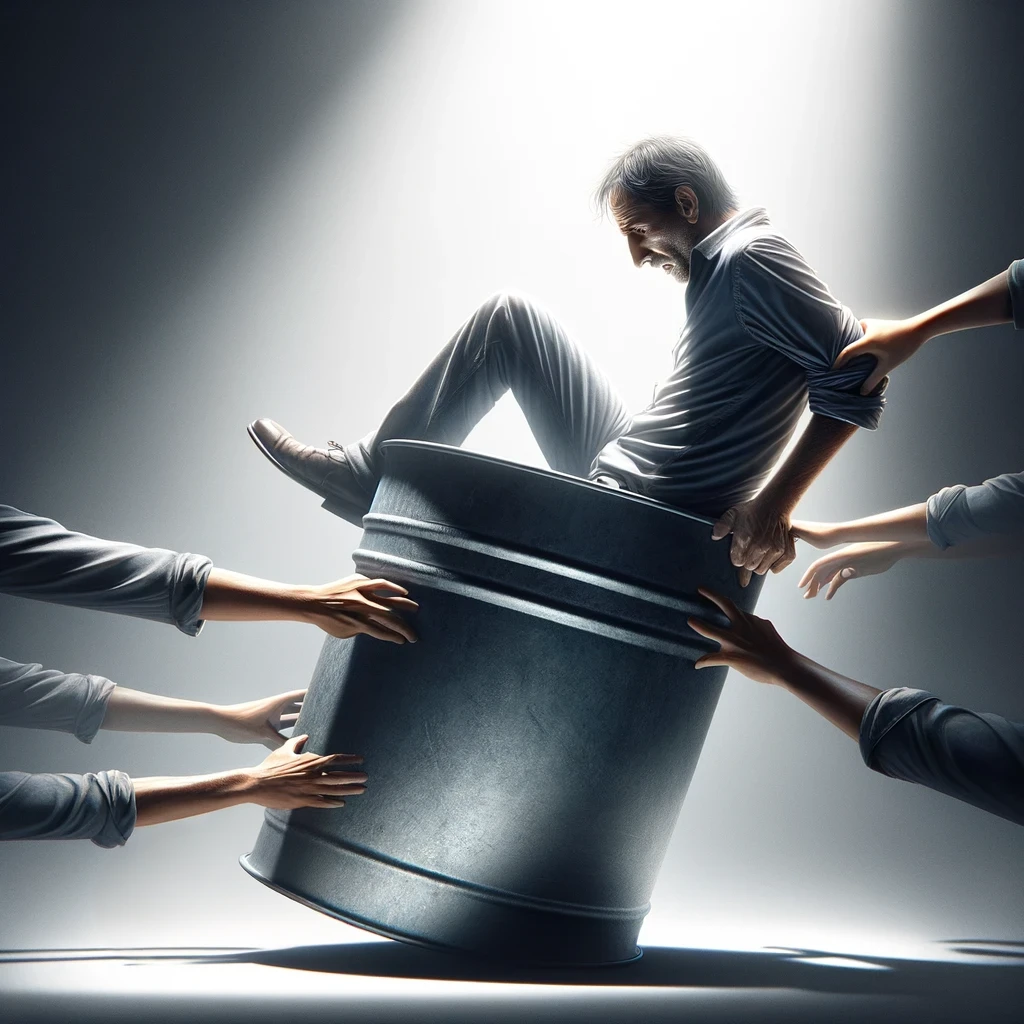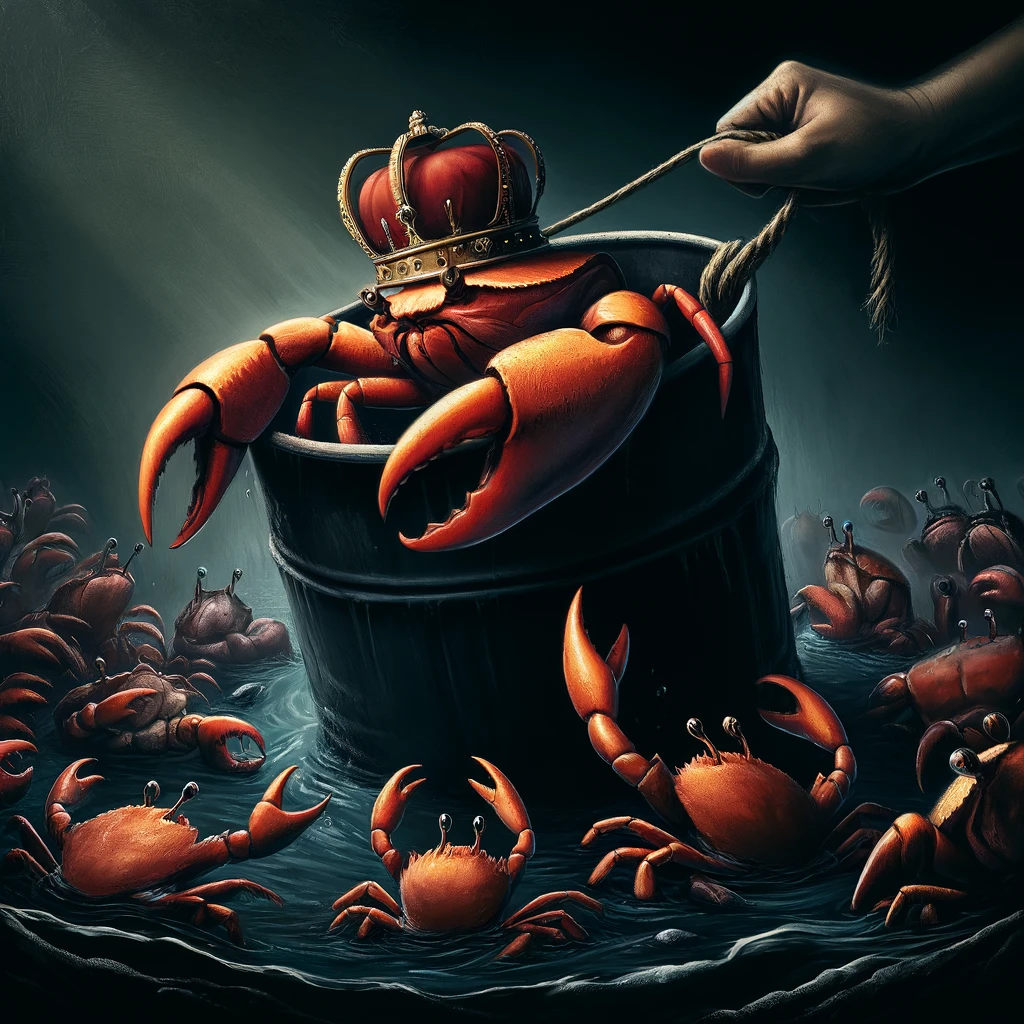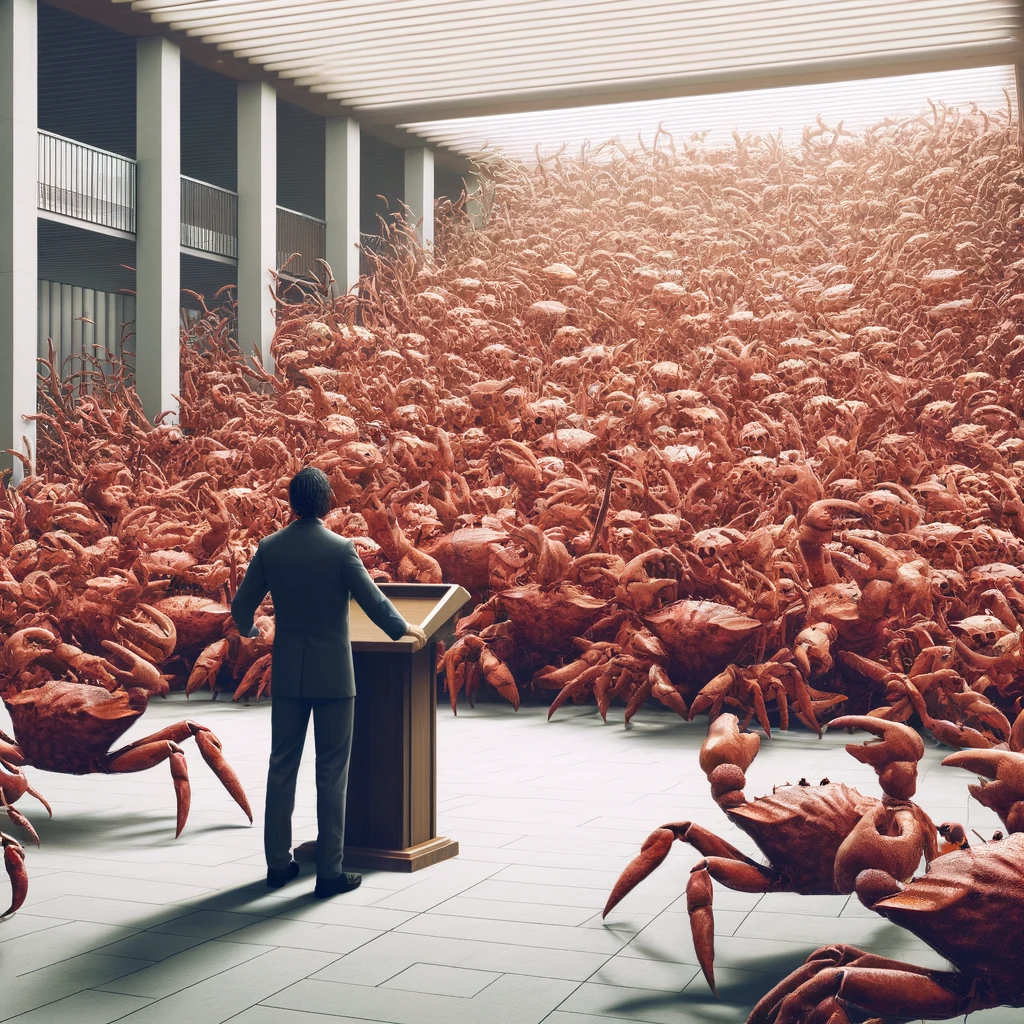Escape the Bucket

Escape the Bucket
The story of “crabs in a bucket” is a metaphor that illustrates a particular aspect of human behavior—specifically, how individuals within a group can undermine each other’s efforts to succeed or escape a detrimental situation. The story goes like this:
Crab Mentality
If you place a single crab into a bucket, it could easily climb out and return to freedom. However, if you put multiple crabs into the same bucket, the outcome is different. As one crab attempts to climb out and escape, the others will grab hold of it and pull it back down. In some cases, the crabs might even work together to drag their fellow back into the bucket. As a result, none of the crabs can escape, and all remain trapped in the bucket.
This phenomenon isn’t due to a concerted effort to keep everyone imprisoned, but rather an instinctual and competitive reaction among the crabs. They don’t realize that by preventing others from escaping, they are sealing their own fate as well.
This allegory is often used to describe human social behavior, particularly in environments where individuals might discourage or sabotage others from advancing to maintain the status quo or out of a misguided sense of competition or jealousy. It suggests that people sometimes hold each other back, not just due to malice, but also because of an unconscious reaction to the success of others, especially when one’s own circumstances are dire.

Understanding Collective Behavior
The lesson of the crabs is generally used to encourage people to be aware of how collective behaviors can create a toxic environment where no one succeeds. It serves as a cautionary tale about the importance of fostering a supportive community where individuals help rather than hinder each other’s progress. Just as a crab trying to escape a bucket is pulled back by its peers, individuals are often restrained by their community’s collective mindset. It compels us to face the uncomfortable truths underpinning our societal interactions.
In my life, I’ve heard echoes of this parable through the corridors of my social interactions. Naysayers and skeptics echo in my mind, casting doubt on my goals and convictions with remarks like “You’re delusional,” “It’s just a phase,” or “Think of your family.” These comments, though superficially harmless, reflect deep-rooted societal fears of deviation and the challenge of breaking established norms. All that said, I was a liar. No one had any reason to believe me. I had no reason to believe myself. I was the worst kind of crab. I was King Crab.

Crabs in History
In 1692, a period of witch trials plagued a community Massachusetts. An infamous episode in American history, it provides a stark illustration of how communal dynamics can lead to the persecution of individuals who deviate from societal norms. In the tight-knit community of Salem Village, fear and suspicion ran rampant in the late 17th century. Against the backdrop of religious fervor and social tension, a series of accusations of witchcraft were leveled against various members of the community, sparking a wave of hysteria that would ultimately claim the lives of 20 innocent people.
At the heart of the Salem witch trials lay a complex web of interpersonal rivalries, economic competition, and fear. In this tightly knit Puritan community, conformity was not just encouraged – it was enforced through communal policing and strict adherence to religious doctrine. When young girls began exhibiting strange behavior and accusing others of bewitchment, the community’s response was swift and merciless. Suspects were interrogated, tried, and often executed based on flimsy evidence and hearsay. Those who dared to question the legitimacy of the accusations risked being labeled as sympathizers or even witches themselves.
The Salem witch trials serve as a chilling reminder of the dangers of communal policing gone awry. In their zeal to root out perceived threats to their community, the people of Salem Village abandoned reason and empathy, succumbing to a collective hysteria that led to tragedy and loss. But the lessons of Salem extend beyond the confines of history; they serve as a cautionary tale for modern society as well. In an age of social media outrage and cancel culture, the impulse to police and regulate the behavior of others can have far-reaching consequences. Like the residents of Salem Village, we must guard against the temptation to scapegoat and ostracize those who dare to challenge the status quo.
Instead, let us strive to cultivate a culture of empathy and understanding, where diversity of thought and expression is celebrated rather than condemned. Only then can we break free from the confines of the bucket and embrace the boundless potential of human creativity and innovation.

Contemporary Crabs: The Case of JBP
A more recent example of communal policing can be found in the public and professional backlash against Jordan Peterson, a clinical psychologist and professor, known for his controversial stance on free speech issues. Peterson rose to prominence in 2016 after publicly opposing Canada’s Bill C-16, which he argued compelled speech by mandating the use of preferred pronouns for transgender individuals, a claim that sparked widespread debate over free speech and gender identity. Peterson’s views ignited a firestorm of controversy, leading to significant public backlash. He faced protests at university campuses, attempts to bar him from speaking publicly, and calls for his dismissal from his academic position. Critics argued that his comments contributed to a hostile environment for transgender people, while supporters defended his right to express dissenting views on contentious topics.
The polarized response to Peterson underscores the potent impact of digital platforms in amplifying communal policing. In the court of public opinion, there was little room for nuanced discussions about free speech and civil rights. Instead, the discourse often veered towards extreme polarization, with Peterson either vilified as a figure of hate or celebrated as a martyr for free speech. This dynamic illustrates how quickly and forcefully communal policing can act to enforce conformity or punish deviation from accepted norms, impacting careers and public discourse in the process. In this hyper-connected world, communal policing has taken on new dimensions, as individuals wield the power of social media to enforce conformity and punish dissent. The consequences of communal policing can be devastating, leading to the erosion of empathy, understanding, and freedom of expression.

Challenge the Crab Culture
Let us strive to cultivate a culture of compassion and forgiveness, where mistakes are met with understanding rather than condemnation. Only then can we break free from the confines of the digital bucket and embrace the full diversity of human thought and expression. As I delve into the psychology of human behavior, I recognize that judgment often stems from fear—a defensive mechanism to cling to familiar ideologies. This behavior is rooted in our evolutionary need for group cohesion, where any deviation was seen as a threat to collective stability.
In our modern context, we battle these instincts not through physical confrontations but through verbal interactions, where criticisms can leave deep psychological scars. The trend towards falsely claiming victimhood and signaling virtue complicates these further, obscuring paths to genuine personal growth. In response, I’ve learned the importance of fortifying my inner resilience against both external judgments and self-imposed barriers. Proactively shaping our social and psychological environments is crucial for fostering growth and empowerment. To guard against external negativity, we must be selective about our associations and media consumption, focusing on positive influences and setting boundaries against harmful interactions. Surrounding ourselves with supportive individuals helps us maintain perspective and resilience. Moreover, developing a robust inner self—through practices like mindfulness, journaling, or therapy—strengthens our defenses against external pressures, fostering mental and emotional well-being.
In today’s rapidly evolving societal landscape, the acceptance of prevailing ideologies without critical examination can have profound and often nefarious implications. Ideologies, by their very nature, provide a framework through which we interpret the world, but they can also blind us to alternative viewpoints and lead to the marginalization of dissenting voices. The danger lies not only in the suppression of debate but also in the potential for these ideologies to be co-opted by individuals or groups with specific agendas. When ideologies become dogma, they stifle innovation and critical thinking, fostering an environment where questioning the status quo is seen not as healthy skepticism but as a threat to collective stability. This can lead to a homogenization of thought that undermines the rich diversity of human perspective and experience.
Moreover, the uncritical acceptance of ideologies can pave the way for the rise of authoritarianism. History is replete with examples where leaders have exploited widely accepted ideologies to justify oppressive policies and consolidate power. These actions are often masked as efforts to protect the ideological purity of a society or to defend against perceived enemies, both internal and external, thereby manipulating public sentiment and curtailing freedoms under the guise of maintaining order and security. In addition, this acceptance often operates at a subconscious level, where societal norms and values are internalized to such an extent that individuals may not even be aware of their ideological biases. This subconscious influence can be particularly insidious, as it allows for the manipulation of public opinion through media, education, and other cultural institutions, gradually shaping the collective consciousness in ways that may go unquestioned.

Out of the Bucket; or, I’m Molting
To counteract these tendencies, it is crucial for individuals and societies to foster a culture of critical thinking and open discourse. Encouraging education that challenges students to question and analyze rather than to conform, promoting media literacy to discern bias and agenda, and supporting institutions that uphold the principles of open debate and inquiry are essential steps in safeguarding against the dangers of uncritically accepting prevailing ideologies.
By maintaining vigilance and fostering an environment where questioning is encouraged, societies can protect against the nefarious impacts of ideology and ensure a more thoughtful, inclusive, and dynamic public discourse.
The “crabs in the bucket” allegory not only illustrates the challenge of overcoming communal constraints but also emphasizes the importance of personal resilience and growth. As we strive to transcend societal norms and explore our potential, we must remain vigilant against the forces of conformity and fear. By challenging the status quo and addressing our limitations, we unlock the vast expanse of human potential.



Right on you are killing it!!!